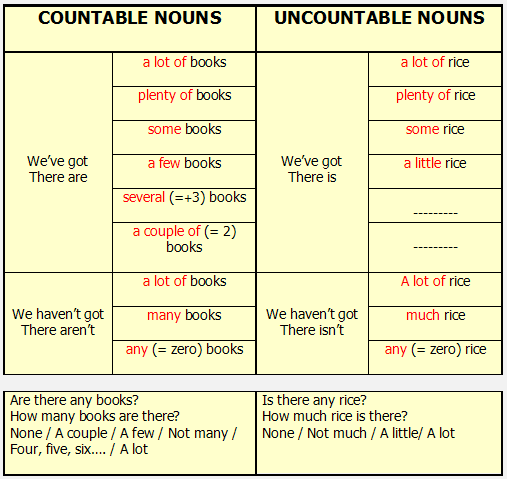Learn English

- Grammatube - Learn Everything About Countable And Uncountable Nouns
How many money do you have? / How much money do you have? Do you know which of the previous questions is wrong? Which one sounds ?strange?? The key is to understand how to use countable and uncountable nouns in English. In this new post we introduce...
- Noun Exercise 2
Before doing the exercises you should have a look on the lesson on countable and uncountable nouns in page English grammar Decide whether these nouns are countable (C) or uncountable (U) The birds are flying in the sky. (C/U) A rise in oil prices...
- Countable & Uncountable Sentences
Many times we get confused in using countable or uncountable nouns in our sentences .here are some examples that how to use them in your sentences correctly. Countable Can I have some books please?How many people attended the function?How...
- Definition Of Noun & Type Of Noun
Noun definition A word used to identify any of a class of people, places, or things (common noun), or to name a particular thing, not only physical also for abstracting thing such as happiness, beauty. A noun can function as a subject,object,complement,...
- There Is And There Are In English
We use there is and there are to say that something exists. Positive SentencesWe use there is for singular and there are for plural.There is one table in the classroom.There are three...
Learn English
Countable and Uncountable Nouns in English
A) Most nouns have singular and plural forms. They are countable nouns.
e.g. One letter, two letters
- There is a letter on the table for you. (singular)
- There are letters on the table for you. (plural)
B) Some nouns only have one form. They are uncountable nouns.
e.g. Money
- There is no money in my bank account.
- There is a lot of money in my bank account.
C) Many uncountable nouns refer to substances:
e.g. Chocolate, water, coffee, milk, sugar, salt, cheese, bread, rice, wood, glass, plastic, soap, toothpaste.
- Do you have any chocolate?
- The milk is sour - let's make cheese.
- Rice is only edible when it has been cooked.
D) Many uncountable nouns refer to abstract ideas or emotions.
e.g. love, sadness, happiness, education, knowledge, and grammar.
- Money can't buy love.
- We like to experience happiness.
- This education is priceless.

E) You can use a/an with singular countable nouns.
e.g. an umbrella, a wheel, a mistake.
- It's raining so I need an umbrella.
- I made a mistake.
- This is a job for superman.
F) You can use plural countable nouns alone.
e.g. apples, bees, clouds.
- There are clouds in the sky today.
- There are bees making honey.
- We eat apples for breakfast.
G) You can't use an article with an uncountable noun.
e.g. time, sand, electricity.
- We need electricity to use our heater.
- I lost track of time and we stayed up very late.
- The beaches in Brazil have very nice sand.
H) It is very common in English to use some / any with plural nouns and uncountable nouns (Refer to grammar notes on Some Any for more details).
e.g. They don't listen to any advice.
- We don't have any toys for the children.
- There are many lessons in life, this is just one more.
- It is important to have some knowledge of grammar.
I) There are a range of nouns that are uncountable in English but are countable in other languages.
These include: accommodation, advice, baggage, behaviour, bread, chaos, damage, furniture, information, luck, luggage, news, permission, progress, scenery, traffic, weather and work.
J) For comparison purposes, look at these sentences:
| Countable | Uncountable |
| I'm looking for a job. | I'm looking for work. |
| What a beautiful view! | What beautiful scenery! |
| It's a nice day today. | It's nice weather today. |
| We had a lot of bags and suitcases. | We had a lot of luggage. |
| These chairs are mine. | This furniture is mine. |
| It was a good suggestion. | It was good advice. |
- Grammatube - Learn Everything About Countable And Uncountable Nouns
How many money do you have? / How much money do you have? Do you know which of the previous questions is wrong? Which one sounds ?strange?? The key is to understand how to use countable and uncountable nouns in English. In this new post we introduce...
- Noun Exercise 2
Before doing the exercises you should have a look on the lesson on countable and uncountable nouns in page English grammar Decide whether these nouns are countable (C) or uncountable (U) The birds are flying in the sky. (C/U) A rise in oil prices...
- Countable & Uncountable Sentences
Many times we get confused in using countable or uncountable nouns in our sentences .here are some examples that how to use them in your sentences correctly. Countable Can I have some books please?How many people attended the function?How...
- Definition Of Noun & Type Of Noun
Noun definition A word used to identify any of a class of people, places, or things (common noun), or to name a particular thing, not only physical also for abstracting thing such as happiness, beauty. A noun can function as a subject,object,complement,...
- There Is And There Are In English
We use there is and there are to say that something exists. Positive SentencesWe use there is for singular and there are for plural.There is one table in the classroom.There are three...
